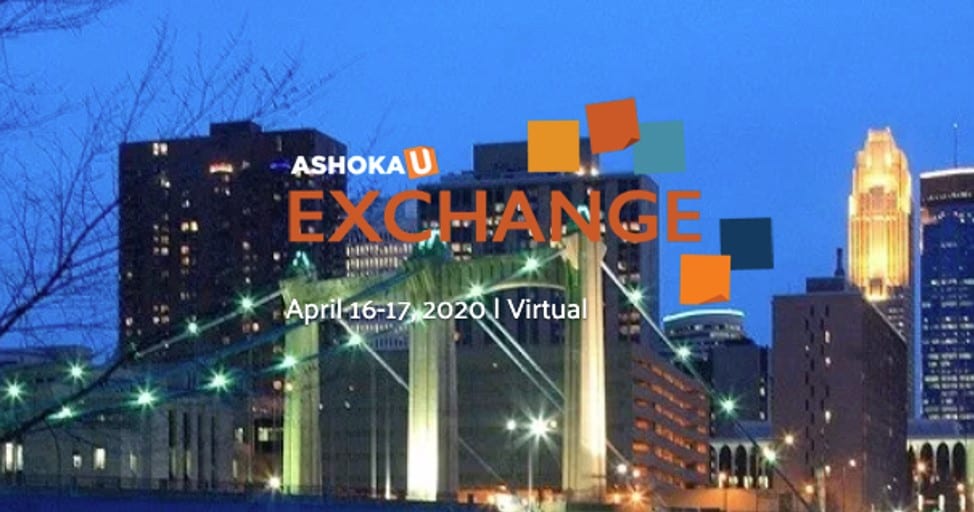
Taylor Team Joins the Research & Evaluation Track at the Virtual Ashoka U Exchange
Written by: Máille Faughnan & Laura Murphy
In light of the necessary lock-downs, social distancing, and the escalating public health threat of the global coronavirus pandemic, the world’s leading conference on social innovation in higher education –the Ashoka U Exchange — made a timely and smart decision to go online. The first ever virtual Exchange will take place April 16-17.
The Research & Scholarship team are excited to be part of this virtual conference. We are looking forward to attending sessions on “organizational culture change” and “decolonizing social innovation”; we will also be sharing some of our work and supporting conversations with faculty and scholars around the world.
Máille Faughnan, a Research Fellow and Instructor in the SISE undergraduate minor, is one of the Taylor team members who will be participating remotely. She is co-organizing a ‘best practice’ session on Community-Based Action Research as a Change Strategy: Power, Equity and Impact with university and organizational partners. The session is cheduled for Thursday April 16 at 10 am CST. The panelists will frame their session around a paradigm of inquiry called “action research”, which encompasses many research designs that tend to be participatory and grounded, and that tackle real-world problems to advance human flourishing.
Faughnan proposed the idea for an “action research” panel to a scholarly network formed out of the Ashoka U-sponsored Social Innovation Writing Retreat that takes place at Middlebury’s Bread Loaf Campus (and is unfortunately not happening this year!). Theresa Ricke-Kiely, the Director of the Center for the Common Good at the University of St. Thomas, immediately signed on. Because this is essentially a presentation about community-based research collaborations, both Faughnan and Ricke-Kiely asked representatives from long-term community partner organizations to join them: Angela Kyle of PlayBuild NOLA (New Orleans-Tulane connection) and Christine Pulver of Keystone Services (St. Paul-UST connection). Ricke-Kiely also pulled in Emily Oliver, Associate Director for Academic Civic Engagement in the Center for Civic and Community Engagement at Carleton University, to facilitate.
Together, the panelists have lots of experience wading through the messy and rewarding work of university-community engagement and scholarship. Their research, service and class projects seek to be impactful in process and content, for partners, students and wider scholarly audiences. In their session, they invite the audience in to get an inside look at how they are building mutually-beneficial partnerships as a foundation for action research. They’ll get practical and philosophical about the mechanics of this process, from how they’re having conversations about setting up a research agenda to what co-ownership of data looks like and how to conduct research in this “remote era” with participants who have limited digital connectivity.
At the urging of Ashoka U – which has done a great job of building a more inclusive and equity-focused conference over the last few years – Faughnan and her co-presenters will start their session with messages about mindfulness, as well as a land acknowledgement to highlight the Indigenous histories and land rights of each panelist’s location. Faughnan is working with other members of Taylor and Tulane to develop a statement for the Taylor Center, to build on our strategic diversity, equity and inclusion initiatives. It’s time for the Center to make “decolonization” a focus of all our efforts – including research and scholarship.
Dr. Faughnan’s session is part of the Research and Evaluation track, which is a relatively new area for the Exchange. Another Research & Evaluation session that we have our eyes this year on is Research as a Tool for Social Change and Innovation (scheduled for Friday 3:45 ET/2:45 CST). It’s led by Canadian researchers Brian Belcher (Royal Roads U.), Crystal Tremblay (U. Victoria) and Steve Dooley (Simon Fraser U.). This session will complement our own action research presentation by comparing traditional research approaches and community-engaged strategies. But what really caught our attention is the panelists’ intended outcome: “a call to action for Ashoka” to find the synergies between changemaking endeavors and research agendas.
Ashoka U collaborates with higher education institutions to “foster a campus-wide culture of social innovation.” Tulane faculty and staff have been attending the Exchange since 2009, when we joined Ashoka U’s changemaker campus network. Taylor has always had a large presence since 2014 because we want to be part of the conversations happening at the largest convening for social impact education in the world.
Recognizing the global pandemic and its challenges for travel and gatherings, they shifted to an online platform.. What’s exciting about this shift is that the virtual platform might even offer more people a chance to participate in the keynotes and smaller sessions, with a lower registration fee and no costs for travel and accommodation, of course. Read the FAQ about the Exchange.
Please check it out and register at their reduced rate if you can, to join us there in continuing the work of promoting changemaking education, research and community-engagement.
And please learn more about the R&S team or email us to connect with our work.